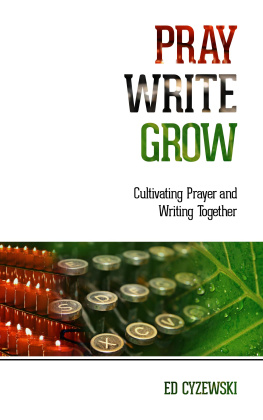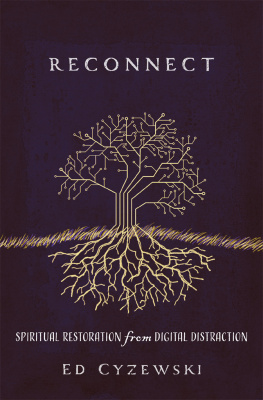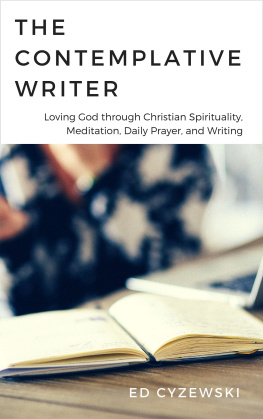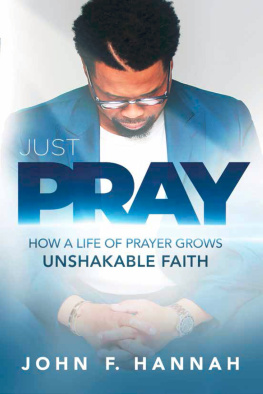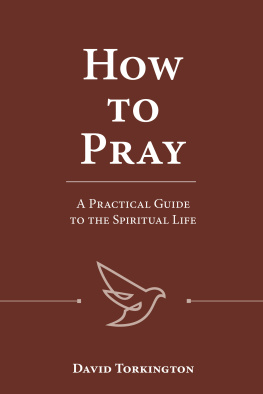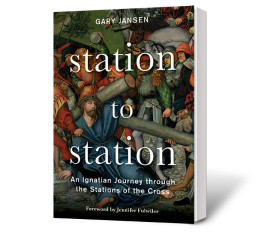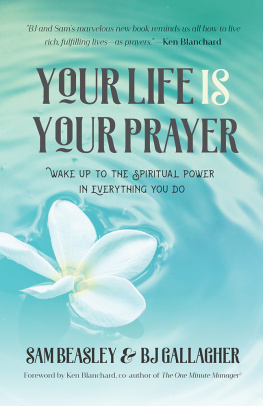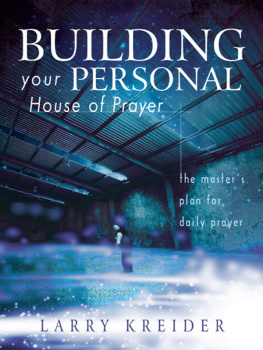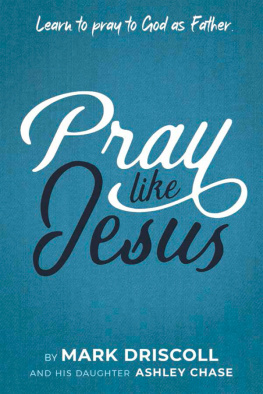Also by Ed Cyzewski
Evangelicals After the Shipwreck
The Great Evangelical Retreat
Why Evangelicals Need the Wilderness
Evangelicals Need Roots to Grow
Standalone
Creating Space: The Case for Everyday Creativity
Why We Run from God's Love
A Path to Publishing: What I Learned by Publishing a Nonfiction
Pray, Write, Grow: Cultivating Prayer and Writing Together
First Draft Father: A Write-from-Home Dad Finds the Joy/Anxiety/Exhaustion/Wonder of Parenting
Coffeehouse Theology: Bible Study Guide
Write without Crushing Your Soul: Sustainable Publishing and Freelancing
Become a Better Faith Blogger
The Contemplative Writer: Loving God through Christian Spirituality, Meditation, Daily Prayer, and Writing
Coffeehouse Theology: Reflecting on God in Everyday Life
Flee, Be Silent, Pray: An Anxious Evangelical Finds Peace with God through Contemplative Prayer
Independent Publishing for Christian Authors: A Guide to the Why, When, and How for Writers
Watch for more at Ed Cyzewskis site.
Pray Write Grow - for effing iBooks
by Ed Cyzewski
* * *
Join My Community of Readers
You can get TWO FREE eBooks, first dibs (as well as discounts) on new book releases, and learn about my other books by signing up for my e-newsletter.
Sign up Today
* * *
Pray, Write, Grow: Cultivating Prayer and Writing Together
By Ed Cyzewski
2015
Ed Cyzewski, All Rights Reserved
Cover Design by Renee Malloy Ludlam
http://www.reneemalloyludlam.com/
Feel free to quote up to 300 words in print or online with full citation and/or a hyperlink to the book at a retailer's website. For longer quotations or multiple quotations, contact Ed at edcyzewski@gmail.com.
Introduction
Every time you bow your head in prayer, open up a blank document on your computer, or flip open a journal page to write, you're taking a leap of faith. Writers choose to believe they can string together another series of sentences that will speak to the needs of readers somewhere. When people pray, they're choosing to believe there's a good, loving God reaching out to us, listening to our prayers, and meeting with us.
We have faith that the discipline of writing will pay off. If we keep working at it, keep practicing, keep asking for feedback, keep revising, and keep publishing our work wherever possible, we'll get better, reach more readers, and take meaningful steps forward. If we face the most challenging and vulnerable parts of our lives, we have faith that we'll find words that offer clarity and perspective. If we put our words in front of readers, we have faith that some will reply, "Yes! Me too!" If we take the time to continually examine ourselves and care for ourselves, we have faith that the words will continue to come together year in, year out, whatever life throws at us.
We have faith that the practices of silence, praying with scripture, or reciting the prayers passed on to us will bear fruit over time. If we continue to fight through our fears and anxieties in order to sit in silence, we trust that God can meet us, even if it leads to results we aren't expecting or doesn't even result in quantifiable progress. If we continue to cultivate habits of stillness and quiet throughout the day, we have faith that God can meet us and will speak even at moments when we aren't expecting to hear anything. If we continue to wait on God, we have faith that periods of silence don't indicate God has abandoned us.
We can even have faith that growing in one practice could lead to growth in the other.
Every time I grow as a writer, my prayer time receives direction.
Every time I grow in my prayer time, my writing has increased clarity.
Writing and prayer stand well enough on their own, but many of the disciplines that help you write better will also help you pray better and vise versa. This wasn't something I planned out. I never set out to find connections between the two. Rather, I spend significant parts of each day writing and praying, and at a certain point I started to notice how the two converged. As I prayed, my writing started to shift and grow. Both the disciplines of prayer and the lessons I learned transferred over to my writing, and my writing furthered my personal reflection and helped foster the habits and disciplines I'd been cultivating while praying. When prayer and writing finally started working together in my life, I began to take significant steps forward in both simultaneously. Ironically, I finally saw all of this most clearly while doing neither.
A few years ago I started taking walks with our firstborn son most mornings so that he could nap. We walked nearly every bitter cold winter day with him. I bundled him up in a stroller sleeping sack and a snow suit. He could sleep for one or two hours most days, and I acutely felt the drain on my writing and prayer time. While I typically listened to podcasts during our walks, I began to question the wisdom of this. I had so much work to do. Perhaps I didn't need to listen to podcasts for the entire walk. What if I could use some of the walk to think of writing topics? At the very least I could sit down to write with some fresh ideas scribbled in a pocket notebook.
And if the writing ideas didn't come together, I reasoned that I could recite some prayers. The Jesus Prayer is perfect for filling in time with its simplicity: "Jesus Christ, Son of God, have mercy on me, a sinner." I could also meditate on the scripture verses from the morning office, one of a series of prayers and readings known as "The Hours" or "The Divine Hours" that follow the liturgical calendar and have been practiced by Christians for centuries. The possibilities were endless, really. Almost every Christian I know has said at one point or another, "I don't pray enough." What if my walks could become havens for prayer each day?
Such plans always start with enthusiasm and optimism, but despair quickly begins to take hold. While this plan sounds perfectly sensible in retrospect, I'd been listening to podcasts "religiously" every single day at that point in my life. They were "essential" for my walks. I love podcasts. It's like taking the best of the radio and the internet with you wherever you go. Habits and love for entertainment aside, there was something far worse lingering in the back of my mind--something that I didn't even fully realize until the first time I turned my iPod off and left my headphones in my pocket during a walk.
I'd been using podcasts to avoid being alone with my own thoughts. Podcasts were just one of the many tools I'd been using to avoid self-reflection. As soon as I started walking without podcasts playing, my mind exploded with worry and fear. I can't even say that I was fully aware of this happening. The habits of anxiety and worry simply kicked in as soon as I had some free space in my mind. The podcasts had been one of my strategies for keeping my worries at bay.
Those first few days of trying to walk without podcasts were torture. Some days I caved after a few minutes. Other days I endured the silence of my thoughts for about 30 minutes before flipping my iPod on. I tried to focus on praying. I tried to focus on writing ideas. Instead my mind just spun out of control. I couldn't focus on much of anything. It was a disaster. Before giving up, I tried to make bargains with myself. I finally decided that I couldn't stand being in my own head for an entire walk. The podcasts became a reward on the way home if I could endure the first half of the walk.

